Over Your Dead Body
- Year
- 2014
- Original title
- Kuime
- Japanese title
- 喰女 クイメ
- Director
- Cast
- Running time
- 94 minutes
- Published
- 5 September 2014
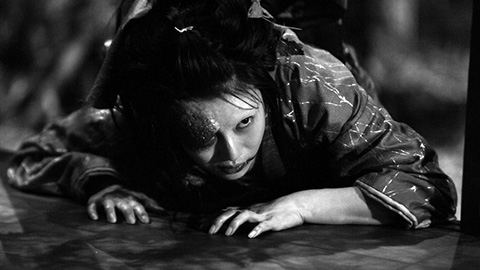
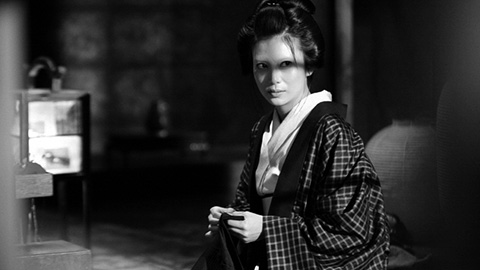
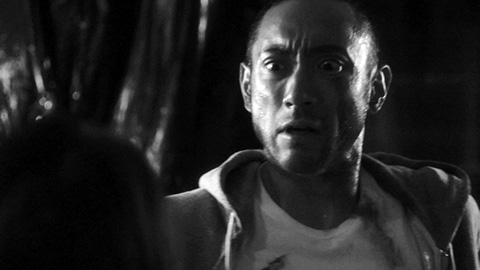
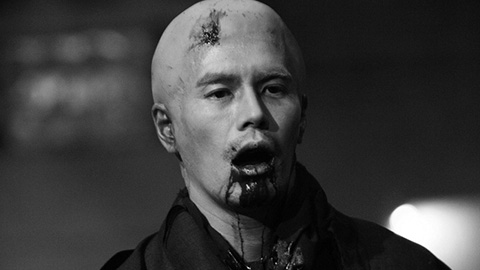
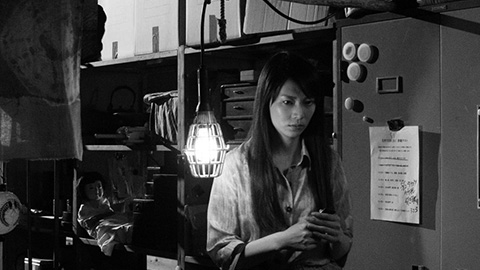
by Tom Mes
The Ghost Story of Yotsuya (Yotsuya Kaidan) should be familiar enough to anyone interested in Japanese film. Previously adapted for the screen by such illustrious and diverse directors as Shozo Makino (a silent 1921 version), Keisuke Kinoshita (a 1949 non-supernatural variation) and, perhaps most famously, Nobuo Nakagawa, it is the quintessential Japanese horror tale.
Penned in the mid-19th century by Tsuruya Nanboku IV, it tells of Iemon, a samurai fallen on hard times who makes a meagre living with his wife Oiwa. Proud Iemon longs to recapture his faded glory and finds it in O-ume, the pretty daughter of a rich merchant. Soon enough, he is scheming to have his wife poisoned so that he can be free to marry into the wealth of O-ume’s family. The toxin horribly disfigures Oiwa’s face, causing festering boils to erupt on her skin. Iemon finds her crawling about the house in spasms, a grotesque caricature of her former self. Believing her to be a demon, he runs his sword through her, but his guilt soon conjures visions of her hideous form. She gets her revenge when the swordsman strikes down his new bride, believing her to be the ghostly Oiwa.
The news that Takashi Miike was tackling a new adaptation of The Ghost Story of Yotsuya, announced around the same time as word came through of his vampires vs. gangsters flick Yakuza Apocalypse, led some sources to herald the return of the "old Miike", Japanese cinema’s bloodthirsty bad boy.
As I have argued before, there is no such thing as a return of the old Miike, since he never went away in the first place. It’s mostly the industry around him and the material it prefers to churn out that did the changing for him. Certainly, there is the influence of a manager who, over the course of the past ten years, shrewdly shepherded the director from the turning point that was Gozu’s selection for the Director’s Fortnight in Cannes, into a mainstream career in the domestic film industry as well as a status as favourite of the highest festival echelon. The alternative would have been the oblivion in which languish other former hotshots of edgier V-cinema genre fare, some of whom have today given up on filmmaking altogether. Which route would you rather take?
(Also worthy of note is how Miike’s manager used the much-maligned production committee system to the filmmaker’s own creative and financial advantage by becoming a co-producer on nearly all his projects.)
However, the trajectory that led Miike through such box-office winners as One Missed Call, The Great Yokai War and Yatterman also included such challenging and experimental works as Izo, the Three... Extremes episode Box and Big Bang Love, Juvenile A. Blood-drenched spectacle, meanwhile, came in the shape of the Masters of Horror episode Imprint, the enjoyably nutty but little-seen Detective Story, and the runaway success that was 13 Assassins – although the latter’s international triumph arguably had everything to do with how it answered to a samurai-duelling-in-the-mud image of Japanese cinema already existing in the minds of a public far larger than the usual Miike audience.
All three of these ‘streams’ of Miike’s recent cinema are present in Over Your Dead Body. The cast is led by three household names – Ichikawa, Shibasaki and Ito – while the film’s domestic theatrical release took place in August, the traditional season when Japanese urban audiences go to watch horror and ghost stories in droves, seeking cold chills as respite from the sweltering summer heat (the J-horror boom having already proven that air conditioning has had no adverse effect on either this tradition or the chills on offer).
Reusing the narrative structure of Audition, the first half of Over Your Dead Body plays out like a slow-to-boil relationship drama, albeit one shaped as a meditation on theatre, cinema and performance. The story, adapted by Kikumi Yamagishi from her own novel rather than from the original Yotsuya Kaidan, revolves around Kosuke and Miyuki, a present-day actor couple who play the roles of Iemon and Oiwa in a new theatrical version of the play. As Miyuki believes that she is pregnant with his child, Kosuke begins an affair with their co-star, the young actress cast in the role of O-ume.
For its first forty-five minutes, Over Your Dead Body is all arty restraint, gorgeous set design, and cold stares between stars Ichikawa and Shibasaki. And then the DIY abortion scene happens. Though shot with relative moderation (by Miike standards), this sequence tips the film into bloodier, much more lurid territory, as the off-stage feud between the actors/lovers begins to mirror and merge with that between Iemon and Oiwa and escalates into a cascade of homages to kaidan eiga, J-horror, and Shintoho-style B-grade shockers (as well as a climactic tribute to Paul Verhoeven’s The Fourth Man).
The central presence of the theatre points to another characteristic of the filmmaker’s recent output. Star Ebizo Ichikawa is of course better known for his work on the kabuki stage, but Takashi Miike also directed two theatre plays in the previous decade: one a star-studded adaptation of Kyoka Izumi’s tale of maritime spirits Demon Pond (Yashagaike) and the other a Sho Aikawa-starring version of Zatoichi. The director’s experience with the theatre doubtlessly influenced his decision to tackle Over Your Dead Body, and while some of his previous films could certainly be considered theatrical in style, the material he has at hand here allows Miike to portray a very blue-collar image of the milieu.
The story’s star couple inhabit spacious postmodern dwellings, but the rehearsals for the play-within-the-film are set in the more prosaic dilapidated concrete settings of Tokyo’s aging studio complexes, similar to those evoked in Ken Ochiai’s recent homage to old-school studio system filmmaking, Uzumasa Limelight. Stars and crewmembers alike sit on rows of identical bare wooden chairs, irrespective of marquee value, a light bulb burning dimly on a desk here and there. No imagined showbiz pseudo-glamour, but a genuine, lived (and lived-in) corner of human interaction.
This makes Over Your Dead Body at once poetic and prosaic, a film that conjures the supernatural while remaining resolutely down-to-earth. It is full of imagination yet free of pretension. Go see it if you have the chance.